Can You Lease a Used Car?

Ever thought about leasing a car but don’t want to deal with the hefty price tag of a brand-new model? Well, good news—you can actually lease a used car! While it’s not as common as leasing new vehicles, used car leasing is definitely an option and might be the perfect solution for your needs. Let’s chat about how it works, the pros and cons, and what you should keep in mind if you’re considering this route.
So, How Does Leasing a Used Car Work?
Leasing a used car is pretty similar to leasing a new one. You’re essentially renting the car for a set period, usually between 2 and 4 years. The big difference is that the car isn’t fresh off the assembly line—it’s pre-owned. Often, these are cars that were previously leased and then returned, known as Certified Pre-Owned (CPO) vehicles. They’ve been checked out, spruced up, and are in great shape.
When you lease one, your monthly payments are based on the car’s current value minus what it’s expected to be worth at the end of the lease (that’s called the residual value). Since used cars have already taken their biggest depreciation hit, the difference between these values is smaller, which can mean lower monthly payments for you.
Why Would You Want to Lease a Used Car?
Lower Monthly Payments
Who doesn’t like saving money? Because the car has already depreciated, you’re often looking at lower monthly payments compared to leasing a brand-new car. It’s a smart way to get more bang for your buck.
Drive a Nicer Car for Less
Leasing used can let you drive a higher-end model or luxury brand that might be out of your price range if you were buying or leasing new. Fancy a BMW or a Lexus? This could be your chance!
Less Worry About Depreciation
New cars lose value the minute you drive them off the lot. By leasing a used car, you’re sidestepping that initial steep drop in value. It makes the overall cost of leasing more reasonable.
Option to Buy
If you love the car, you usually have the option to buy it at the end of the lease. Since the car’s value has depreciated, you might be able to snag it at a pretty good price.
Potential Downsides
Limited Choices
Not every dealership offers used car leases, so your options might be a bit limited. You might have to do some digging to find the car you want.
Potential for More Maintenance
Used cars can come with more wear and tear. Even though CPO cars are inspected, they’re still not brand new. You might face higher maintenance or repair costs compared to leasing a new vehicle.
Possibly Higher Interest Rates
Sometimes, leasing companies charge higher interest rates (they call it the money factor) on used cars because they’re considered a bit riskier. This could eat into the savings you’re getting from lower depreciation.
Older Tech and Features
If having the latest tech and safety features is important to you, a used car might not have everything you’re after. Newer models will have the most up-to-date gadgets.
Things to Keep in Mind
Check the Car’s History
Always get a vehicle history report. You want to make sure the car hasn’t been in any major accidents or had serious repairs.
Know the Warranty Details
Find out what kind of warranty comes with the car. Is there any manufacturer warranty left? Does the dealer offer an extended warranty? Knowing this can save you from unexpected costs down the line.
Read the Lease Terms Carefully
Make sure you understand all the details—mileage limits, wear-and-tear policies, fees, all that stuff. Sometimes, used car leases have stricter terms, so you don’t want any surprises.
Do the Math
Add up all the costs: monthly payments, any upfront fees, insurance, and potential maintenance expenses. Compare this total to what you’d pay leasing a new car or buying a used one outright. It’s good to see the full picture.
Consider Gap Insurance
Gap insurance covers you if the car is totaled or stolen, and you owe more than it’s worth. Check if this is included in your lease or if you need to get it separately.
How to Go About Leasing a Used Car
- Find Dealerships That Offer Used Car Leases: Not every dealership offers used car leases, so you might need to shop around. Brands like BMW, Audi, and Lexus often have CPO leasing programs.
- Pick the Right Car: Look for reliable models. Consider the car’s history, mileage, and overall condition.
- Take It for a Spin: Test drive the car to make sure you like how it feels and that everything’s working properly.
- Negotiate the Deal: Just like with any car deal, negotiate the price, interest rate, and any fees. The lower the starting price, the lower your payments.
- Read Before You Sign: Go over the lease agreement carefully. Don’t hesitate to ask questions if something doesn’t make sense.
- Enjoy Your New Ride: Once everything’s sorted, sign the papers and hit the road!
Alternatives If You’re Not Sold on Leasing Used
- Lease a New Car: You’ll get that new car smell and the latest features.
- Buy a Used Car: If you plan to keep the car for a while, buying might make more financial sense.
- Buy Certified Pre-Owned: You get the benefits of a used car price with added warranties and assurances.
- Finance a New Car: Sometimes, low-interest financing deals make buying new more affordable than you’d think.